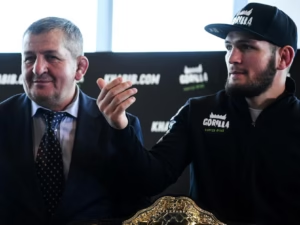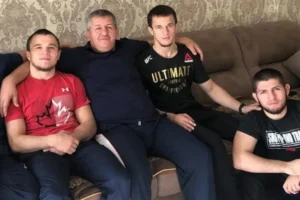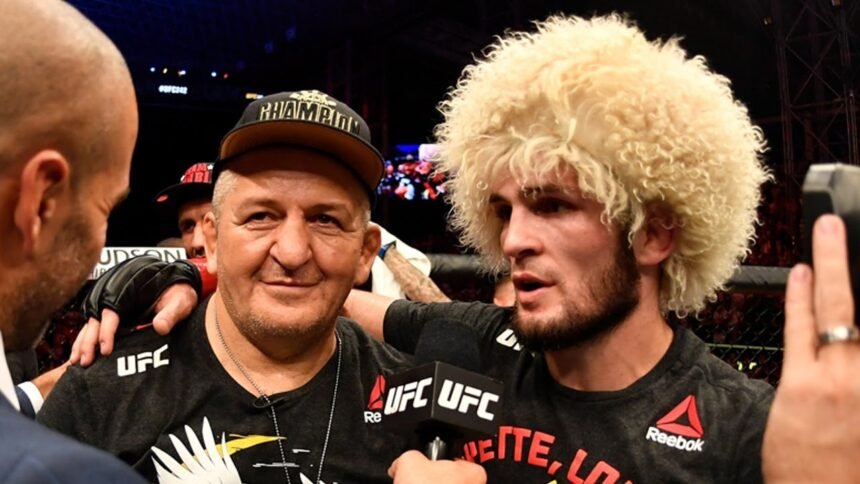When people speak about Khabib Nurmagomedov’s dominance in the UFC, it is impossible to separate his success from the man who shaped him— Khabib father, Abdulmanap Magomedovich Nurmagomedov. More than just a coach, Abdulmanap was a father, teacher, mentor, and visionary who dedicated his life to martial arts and discipline. His story reflects sacrifice, resilience, and an unshakable belief in hard work.
BIO TABLE
| Attribute | Details |
|---|---|
| Full Name | Abdulmanap Magomedovich Nurmagomedov |
| Known As | Khabib’s Father, Legendary MMA Coach |
| Date of Birth | December 10, 1962 |
| Place of Birth | Sildi, Dagestan ASSR, Soviet Union (now Russia) |
| Date of Death | July 3, 2020 |
| Age at Death | 57 years |
| Nationality | Russian (Dagestani) |
| Religion | Islam |
| Height | Approx. 5 ft 9 in (175 cm) |
| Occupation | Martial arts coach, athlete, military veteran |
| Sports Background | Freestyle Wrestling, Judo, Combat Sambo |
| Education | Degree in Accounting & Economics – Poltava University of Economics and Trade |
| Family | Father to 3 children (including Khabib Nurmagomedov); Brother – Nurmagomed |
| Spouse | Name not publicly disclosed |
| Net Worth | Estimated $1–2 million (mainly from coaching and gyms) |
| Lifestyle | Simple, disciplined, rooted in Dagestani traditions |
| Social Media | Not personally active; remembered through family tributes |
| Key Achievement | Recognized as Russia’s most successful combat sambo coach (2019) |
| Legacy | Mentor to UFC champions, built Dagestani MMA culture, father to Khabib |
Early Life and Background
Abdulmanap Nurmagomedov was born on December 10, 1962, in the village of Sildi, Dagestan ASSR, which was part of the Soviet Union at the time. Growing up in the rugged mountains of Dagestan, he experienced a childhood shaped by simplicity, traditional values, and community bonds. Like many in Dagestan, Abdulmanap was introduced to wrestling at a young age, a sport deeply embedded in the local culture.
He developed a keen interest in freestyle wrestling during his school years, training tirelessly and proving himself on the mat. His discipline and determination later led him to pursue judo and sambo, where he found his true calling. His athletic journey was not just about personal success but about planting the seeds for future generations of fighters.
Military Service and Education

Like many men of his generation, Abdulmanap served in the Soviet Army, where he continued to refine his martial arts skills. Military life instilled in him additional discipline, which he would later pass on to his students.
Education was also an important part of his life. He studied accounting and economics at Poltava University of Economics and Trade in Ukraine. Although he could have pursued a more conventional professional path, his heart remained tied to combat sports and coaching. His education, however, gave him the organizational mindset that later helped him manage training programs and run his own gyms.
Career in Combat Sports
Abdulmanap was not only a skilled athlete but also one of the most respected combat sambo coaches in Russia. Over the years, he trained hundreds of athletes and founded his own gym. He was the architect behind Eagles MMA, a team that produced world-class fighters.
In 2019, he was recognized in the Russian Book of Records as the most successful combat sambo coach in the country. Beyond Khabib, his students included future UFC lightweight champion Islam Makhachev, as well as other notable fighters such as Rustom Khabilov and Gadzhimurad Nurmagomedov. His influence spread far beyond Dagestan, making him one of the most admired figures in mixed martial arts globally.
Role as Khabib’s Father and Mentor
For Khabib, Abdulmanap was more than a parent; he was his lifelong coach. From the time Khabib was a child, Abdulmanap emphasized discipline, faith, and relentless training. He famously pushed Khabib to wrestle a bear cub at the age of nine, an experience that became symbolic of his intense upbringing.
Abdulmanap instilled values of humility and respect, reminding Khabib that a fighter’s true strength lies not just in the octagon but in character. Khabib often said that his father’s approval meant more to him than any belt or recognition. Their bond was built on trust, shared faith in Islam, and an unwavering commitment to excellence.
Family and Personal Life
Abdulmanap was a family man at heart. He had three children, with Khabib being the most well-known. Despite his fame as a coach, he preferred to keep his personal life private, ensuring his family maintained a sense of normalcy.
He had a brother named Nurmagomed, who was also involved in sports. The Nurmagomedov family was close-knit, relying on one another for strength and support. Abdulmanap believed in raising his children with the same values that guided his own life—discipline, humility, and respect for tradition.
Physical Appearance and Lifestyle
Standing at an average height of around 5 feet 9 inches (175 cm), Abdulmanap had the strong, athletic build of a lifelong sportsman. Even in his later years, he kept a strict fitness routine, often cycling or training alongside his students.
His lifestyle was simple and deeply connected to his Dagestani roots. He valued faith, family, and community over luxury. Those who knew him personally often described him as humble and approachable, despite his enormous influence in the fighting world.
Net Worth and Financial Standing
Unlike his son Khabib, whose fighting career brought him global wealth and recognition, Abdulmanap’s financial situation was modest. While exact figures are not available, estimates suggest his net worth was in the range of $1–2 million, largely from his coaching career, gym ownership, and affiliations with fighters.
He never flaunted wealth and preferred to live a grounded life. For him, success was measured not by money but by the achievements of his students and the values he instilled in them.
Social Media and Public Presence
Abdulmanap was not very active on social media, though he did occasionally appear in interviews and shared insights about training and discipline. Unlike modern coaches who thrive on online branding, he was old-school, believing that results inside the gym and octagon spoke louder than posts or videos.
However, after his passing, Khabib and others often share tributes to him on platforms like Instagram, keeping his memory alive for millions of fans worldwide.
Illness and Passing
In May 2020, Abdulmanap underwent heart surgery in Moscow. During his recovery, he contracted COVID-19, which caused severe complications. He was placed in a medically induced coma and remained in critical condition for several weeks.
On July 3, 2020, at the age of 57, Abdulmanap Nurmagomedov passed away. His death was a devastating blow not only to his family but also to the entire combat sports community. Khabib, who fought later that year, dedicated his victory to his father and announced his retirement, saying he could not continue without him.
Legacy in the World of MMA

Abdulmanap’s passing left a void, but his legacy continues through the fighters he trained and inspired. His teachings live on in Khabib’s coaching of new fighters, as well as in Islam Makhachev, who carried forward the Nurmagomedov family tradition by becoming UFC lightweight champion.
Beyond titles and recognition, Abdulmanap is remembered as a man who shaped the identity of Dagestani MMA, putting the region on the global map. His life proved that with discipline, humility, and faith, greatness can be achieved even from the most remote corners of the world.
Conclusion
The story of Abdulmanap Nurmagomedov, known widely as Khabib’s father, is one of dedication, sacrifice, and unwavering faith. From humble beginnings in Dagestan to becoming one of the most respected coaches in combat sports, he lived a life of purpose. He was not only the guiding force behind Khabib’s legendary career but also a mentor to countless athletes.
Though he left the world too soon, his influence remains eternal. Every time a Dagestani fighter steps into the octagon, a part of Abdulmanap’s spirit is there. His life reminds us that true legacy is not built on wealth or fame but on the values and lessons we leave behind.
FAQs
Q1: Who was Khabib’s father?
Khabib’s father was Abdulmanap Magomedovich Nurmagomedov, a respected Russian martial arts coach, military veteran, and the man who shaped Khabib into a UFC champion.
Q2: When was Abdulmanap Nurmagomedov born and when did he die?
He was born on December 10, 1962, and passed away on July 3, 2020, at the age of 57.
Q3: How did Khabib’s father die?
Abdulmanap died from complications following heart surgery and COVID-19 infection in Moscow.
Q4: What was Abdulmanap Nurmagomedov’s height?
He stood at around 5 feet 9 inches (175 cm).
Q5: Did Khabib’s father have other children besides Khabib?
Yes, Abdulmanap had three children, including Khabib. He kept his family life private.
Q6: What was Abdulmanap’s net worth?
While not officially confirmed, his net worth was estimated between $1–2 million, mainly from coaching and his gyms.
Q7: Was Abdulmanap active on social media?
No, he was not active on social media himself. However, Khabib and other fighters often share tributes to him online.






